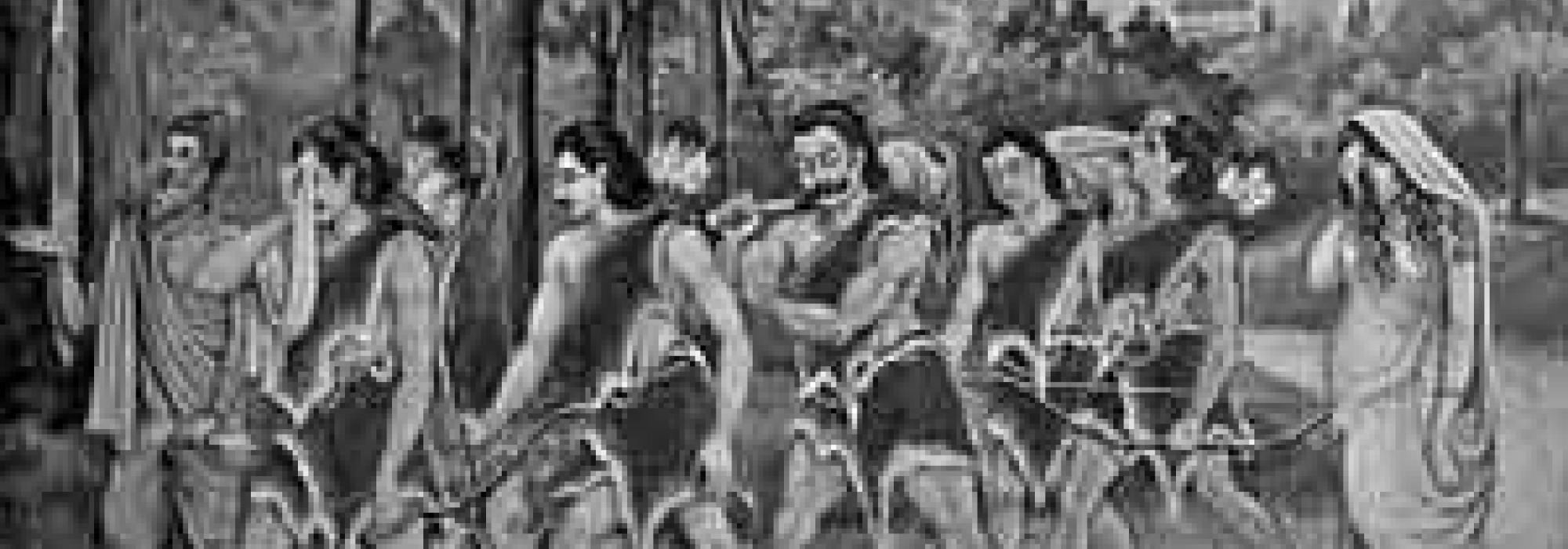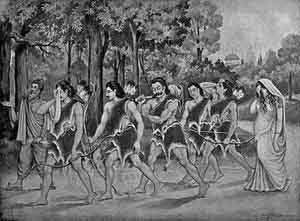Śakuni said, “King Yudhiṣṭhira! Dhṛtarāṣṭra has arranged for the return of all your wealth; what he’s done is right. I’ve now suggested a condition that’s greater than acquiring wealth. If you defeat us in the game of dice, we shall don garments made from deerskin and retire to the forest for twelve years; then we will spend the thirteenth year incognito. If you find our whereabouts in the thirteenth year, we’ll stay in the forest for twelve more years. If we defeat you, similarly you will have to go to the forest for twelve years, taking Draupadī with you, wearing garments made from deerskin, and spend the thirteenth year in hiding. If the thirteenth year passes without us finding you, then you can take back your kingdom. With this agreement, play another round of dice with us!”
The people in the assembly said one after another in many ways, “Oh no! Nobody seems to realize what a huge disaster this is going to turn out to be; there’s no one who is giving the right advice! Are these people relatives? Are they family? Fie upon them! The Pāṇḍavas are unable to recognize even that which is obvious to the mind!”
In spite of having heard these words, Dharmarāja sat down to play a second round of dice; the reason being that he was hesitant and embarrassed to refuse when invited to play. It was also his view that to play the game was dharma. In all this, he never got the thought that the game he was about to play could lead to the destruction of the royal family of the Kurus. And so he said, “Śakuni, will a dharmic king like me ever refuse when invited to play a game of dice? So be it, I shall play!”
Śakuni said, “Elephants, horses, cattle, wealth, grains, servants – all these we have in plenty. Therefore, this game has only one stake – Forest Exile. Whether you win or we win, the loser has to go away to the forest. Let us agree to this and play the game. We shall play just a single round!”
Dharmarāja agreed, Śakuni threw the dice and shouted, “Here, I have won!”
The Pāṇḍavas lost the game and began preparing for their forest exile. Upon seeing that Duśśāsana said, “And now, Duryodhana’s sovereignty has started! The Pāṇḍavas have lost; they have got into trouble; we’ve become greater than our enemy; the Pāṇḍavas have fallen into eternal hell, having lost their comforts and their kingdom; intoxicated by strength, those who mocked the Kauravas have lost all their wealth and prosperity and are setting out to the forest; now let them discard their shining golden robes and wear garments of black antelope skin; those who were flaunting with pride that they have no equals have become as useless as a withered sesame seed – let them realize this! What a huge mistake Yajñasena made by giving his daughter’s hand in marriage to these eunuchs! O Yājñasenī, what sort of comfort will you find in the forest staying with these despicables? Select as your husband any one of the Kauravas, all of whom are patient, mild, and wealthy. At least then you will be saved from all the troubles caused by this irony of fate!”
Upon hearing these cruel words, Bhīmasena pounced on him like a lion and spoke these words in a manner that might subdue him merely by rage, “Hey cruel fellow! In a royal assembly you’re speaking lowly words uttered by sinners! Just as you are wounding the soft spots of our hearts with your word-arrows, in battle, I will tear apart your vulnerable spots and chop you into pieces; your bodyguards will meet with the same fate!” Thus he took an oath with a great roar. Trapped by the frame of dharma, he too donned the garments made from black antelope skin and was engulfed in sorrow. Even as he took his terrible oath, Duśśāsana began dancing shamelessly amidst the Kauravas and began calling Bhīma, “Cow! Cow!” Bhīma grew angrier and said, “Hey Duśśāsana! Having won all our wealth by means of deceit, what are you so proud of? In the battlefield, if I don’t tear your chest and drink your blood, let me not get a place in the heavens. In a short time, I will kill all the Kauravas and attain lasting peace. This is the truth!” Having said this, with the mien of a lion Bhīma stormed out of the sabhā. As Bhīma was walking out, Duryodhana mocked his gait and followed him. Bhīma saw this and half turned around, saying, “Fool! Is it finished with just this? Soon, I will kill you and all your relatives, thus giving a befitting reply to this! In war, I will kill Duryodhana with a mace and smash his head into pieces. I will suck the blood out of this word-warrior Duśśāsana! Arjuna will kill Karṇa! Sahadeva will kill Śakuni!” Accordingly, Arjuna and Sahadeva took oaths.
The Pāṇḍavas informed Dhṛtarāṣṭra and other elders of their departure and left after receiving their blessings. Nobody spoke a word and in their hearts of hearts wished for the well-being of the Pāṇḍavas. Vidura suggested that the aged Kuntī should stay in his house and not accompany the Pāṇḍavas to the forest. Draupadī went to the inner chambers to take Kuntī’s blessings and take leave of her. Everyone there was overcome by grief and wept profusely. Looking at her daughter-in-law who was ready to depart to the forest, Kuntī found it difficult to speak. She said, “My child! Don’t rue about the fact that you are subject to such difficulty! You know strī-dharma well. You are a woman of character and you adhere to all aspects of our tradition. I don’t have to tell you anything about how you must deal with your husbands. Your chastity and purity are adornments to both the family of your birth and the family of your husbands. You and your husbands have escaped the burning fire in the past and indeed that shows the good fortune you all have! Think about me and transcend this troublesome time. The best of women don’t sit brooding about the difficulties in their life. Dharma will protect you; soon, you will attain well-being. Sahadeva is very sensitive; take care that he doesn’t get into trouble!”
Draupadī wore a garment meant to be worn during menses; her hair was dishevelled and unbound; her eyes were filled with tears; and all she said in response before leaving was, “So be it!”
Kuntī followed her, filled with sorrow. She cast a glance at her children. Their bodies were bereft of ornaments and royal robes, they wore just deerskin. They stood there, bowing their heads down in shame. Their enemies rejoiced while their friends lamented. Looking at their situation, Kuntī was deeply afflicted with pain and grief. She embraced them and said, “You have always tread the path of dharma, you have all been magnanimous in charity, you have forever been devoted to the Supreme, and yet you are facing such troubles! What a cruel game of fate this is! I am one who gave birth to you and this must be a result of my misfortune! Not in the least are you all lacking in bravery, strength, enthusiasm, and brilliance and yet you’re being deprived of peace, having been banished to the forests to lead a life of emaciation! If I knew for certain that in the future you would have to face forest exile I would never have made the trip from the Śataśṛṅga Mountain to Hastināpura after your father died. Not having to see his children’s troubles and having attained heaven after becoming an ascetic, your father is indeed so lucky! Mādrī too is fortunate! Perhaps she knew beforehand that you all would face such problems! So she went ahead, leaving me, having surpassed me in every way – in love, in wisdom, in life! Curses to my intellect that desired to live on, facing such difficulties!” Speaking many such sorrow-laden words, Kuntī wept at her fate. The Pāṇḍavas calmed her, giving her solace. Then they offered their salutations to her and left for the forests, deep in grief.
Vidura and others tried to pacify Kuntī who was drowned in sorrow. Then they took her to Vidura’s house. Dhṛtarāṣṭra’s mind was not in peace; his heart was restless and he called for Vidura. He had a long discussion with Vidura. At one point, he said, “Vidura, go at once, call the Pāṇḍavas, ask them to return! If they refuse, then at least send them off with the proper paraphernalia. Let the boys take their weapons along with them. With a few servants, let them ride on chariots and travel comfortably!” But none of that happened. The Pāṇḍavas just went ahead.
The end of the Sabhaparva.
To be continued…


















































